‘Is he alive?’: Lions star reveals 940g son’s terrifying health battle
When the Brisbane Lions’ stellar season resumed in May, forwards coach Jed Adcock and partner Amber Ward were privately enduring the heartache of caring for their premature baby boy, who was born weighing 940g at Mater Mothers’.
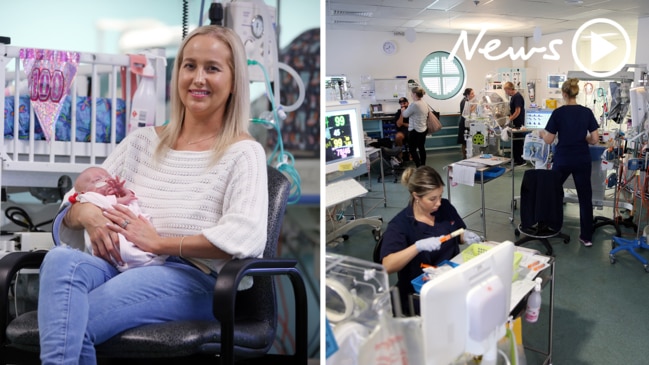
QWeekend
Don't miss out on the headlines from QWeekend. Followed categories will be added to My News.
Jed Adcock and Amber Ward thought their son’s expected birth date was perfectly timed.
Their boy was due to arrive on August 16, towards the end of the AFL season, meaning Adcock could finish his coaching duties for the Brisbane Lions and fall happily into the newborn baby bubble.
So in May when Ward, who was balled up on the rocking chair in the nursery of their Wakerley home, in Brisbane’s southeast, discovered that she was going into premature labour at 25 weeks and six days, the couple was in absolute disbelief.
One week later, on May 16, after a severe bleed left Ward fearing the worst and a second labour was stopped, Hugo Thomas Adcock was born via emergency caesarean.
He was 13 weeks premature, weighing a heartbreakingly small 940 grams.
MATER FOUNDATION AIDS NEONATAL CARE UNIT
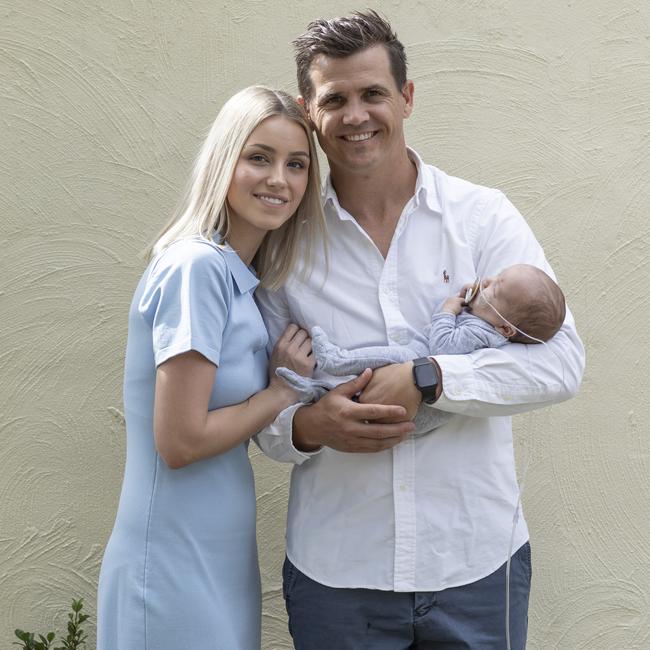
Hugo, who was born at Brisbane’s Mater Mothers’, was taken to the hospital’s Neonatal Critical Care Unit (NCCU) where he would spend the first 89 days of his life, be treated for a small brain bleed, an infection and chronic lung disease and undergo three blood transfusions.
For Ward, 25, holding Hugo, who is now safely at home, is the most precious gift. Looking at her tiny baby boy, she can hardly believe he’s almost five months old already.
A computer chose my baby: How AI created little Charlotte
Amy Sheppard reveals details of romantic proposal
“Nothing can prepare you for seeing them so little,” she says.
“You’ve got machines beeping and dinging and just nothing like you’re ever used to seeing. Looking at him so fragile, he was shiny, he was just not ready to be in the world.
“So many times I just wanted to throw in the towel and I would just cry to Jed and be like ‘I don’t want to do this anymore’, and I would overcome that when I see my little man.
“It’s pretty special. Every time I look at him I just think, ‘We’re so lucky’. He’s our little miracle.”
The couple, who met through mutual friends in late 2018, had dreamt of adding another child to their blended family, which includes Ward’s daughter Lilly, 4, and Adcock’s children Lily, 9, and Archie, 7, from previous relationships.
They were thrilled when they discovered they were having a baby boy, but the year didn’t go to plan. Adcock, a former Lions captain turned forwards coach, was stood down because of the COVID-19 pandemic until the AFL season could resume, which, in cruel timing, ended up being two days after Hugo’s birth in May.
BRISBANE LIONS QUALIFY FOR FIRST PRELIMINARY FINAL SINCE 2004
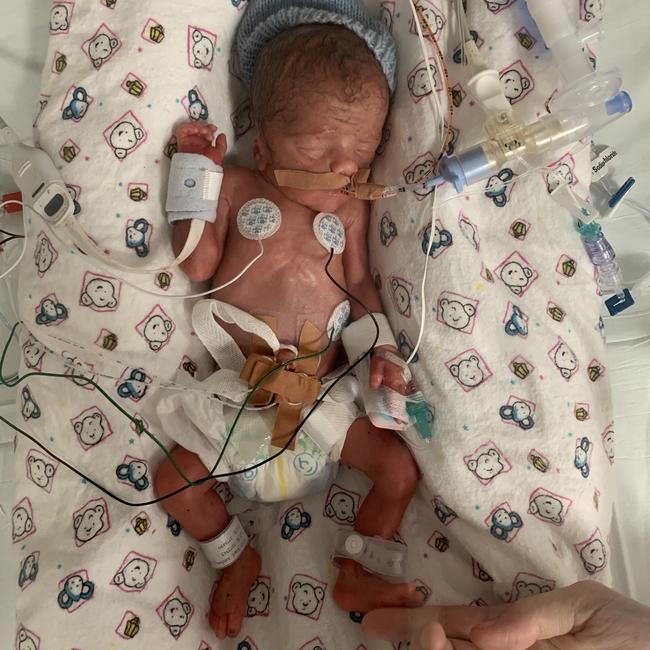
“I didn’t miss a day of work,” Adcock says. “I would go to work and then go to the hospital. Or if we had the kids I would put them to bed and go at about 9pm.”
Adcock, 34, hadn’t been allowed in the operating theatre when Hugo was born.
He had caught eyes with Ward when the monitor showed that their baby’s heart rate had dropped to a dangerously low 60 beats per minute and they feared they were losing him.
Their obstetrician Dr Stephen Cattanach said to Ward, who had a minor placental abruption, ‘I’m so sorry you have to have a caesarean, Jed can’t be in the room’ and so the AFL footballer waited behind, calling out, “So definitely Hugo Thomas?” as she was wheeled away to be put under a general anaesthetic.
“His heart rate was so low. Unfortunately you keep coming back to the worst possible scenario …. and then you worry about Amber,” Adcock says.
“I was only 10 metres away across the hall. You’re just waiting for the nurse to walk in, staring at that wall.”
The nurse emerged 15 minutes later and brought Adcock into a side room to cut the cord of his tiny baby, who had been intubated.
“He couldn’t open his eyes,” Adcock says. “I couldn’t pick him up but I grabbed his hand.”
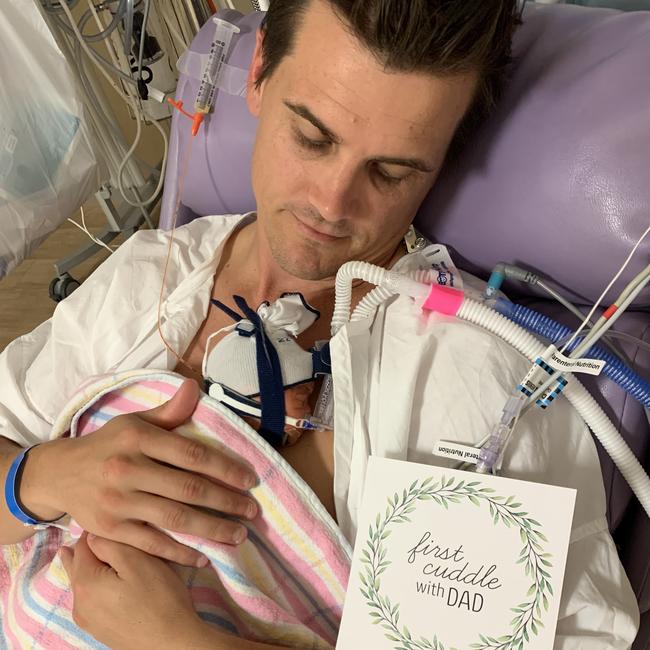
After spending time with his son in the NCCU nursery, Adcock returned to check on his partner, who was desperate to find out that their baby was OK.
“I remember it through pictures,” Ward says. “When I woke up from the general I said to Jed, ‘Is he alive? Is he OK?’ and I just kept asking, ‘Is he OK?’”
At 4am the following day a NCCU doctor called to tell them Hugo, who had developed an infection in the womb, was unwell.
“Hearing that, I just threw the phone at Jed and burst into tears. I couldn’t speak to the doctor. I was just beside myself,” Ward says.
She was unable to get out of bed after the caesarean, so Adcock sat and watched Hugo for 12 hours straight, sending updates via text.
For the next few months, the exhausted parents would take vigil by his bedside, Adcock at night and Ward during the day, holding Hugo for four-hour stints before leaving the hospital, the entrance of which is through the Mater Mothers, without him each time.
“You’re walking every day in and out past parents walking out with their babies, and that is so hard,” Ward says.
“Most days I would walk to the car, get in and just cry the whole way home. It’s hard not having your own baby with you …. I sort of lost myself a bit. You feel really helpless not being able to be a mum to your child.”
But they kept going, with the nurses’ reassurance of, “Two steps forward, one step back” in their minds.
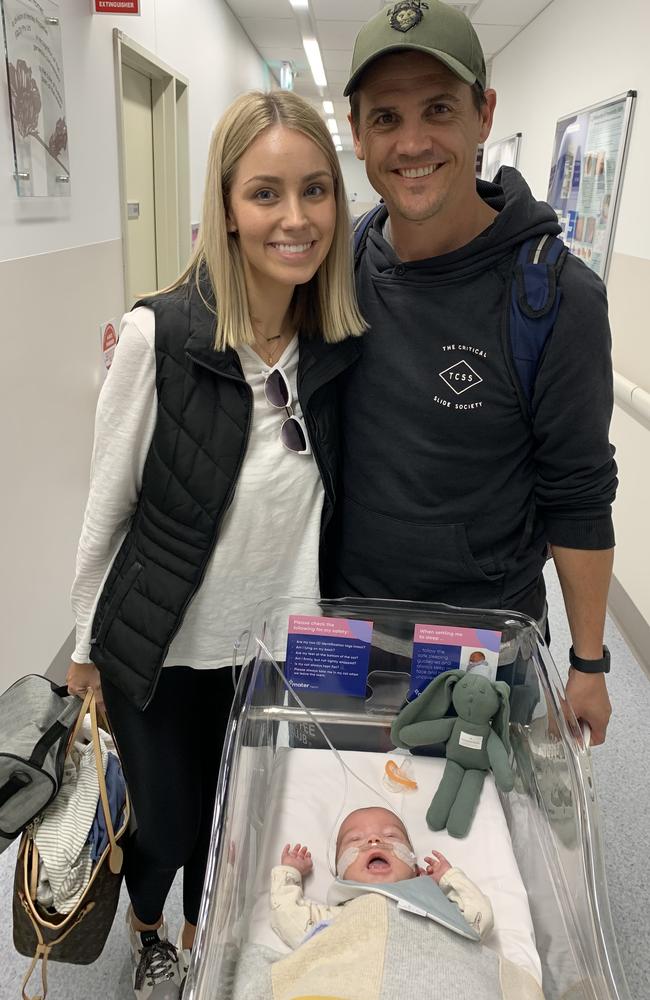
They made friends with the staff and other families in NCCU while their friends, who couldn’t visit due to COVID-19 restrictions, dropped off homemade meals and finished painting Hugo’s nursery.
Wednesday, Adcock’s day off, became their date night, sharing an Uber Eats dinner in the parents’ lounge at the hospital.
Hugo’s neonatologist, Dr Callum Gately, says there was no known reason for the premature birth. But hearing that often didn’t stop mothers from feeling guilt over not carrying their baby to term.
He says what stood out to him about Ward and Adcock was how much they dedicated themselves to holding Hugo, skin-to-skin contact, which he said undoubtedly contributed to the good outcome.
“It weighs on mums’ shoulders heavily – always,” Dr Gately says.
“There’s not many scenarios where a mum arrives at a hospital pregnant and walks out the door without a baby. It’s really traumatic.
“But even when Hugo was less than 1000 grams he was coming out onto Amber and Jed’s skin and being nursed for several hours each day, skin to skin, instead of in an incubator, and they were one of the most amazing set of parents that I’ve seen embrace that, and completely reorganise their lives and their routines to make sure he was getting well cared for.”
Finally on August 13, three days before his original due date, the couple brought Hugo home.
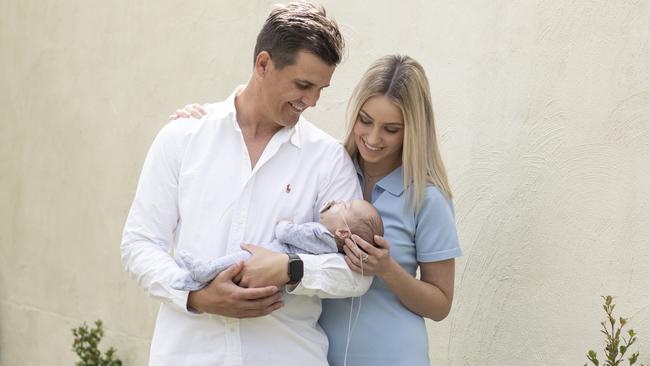
He is still on oxygen, there’s hand sanitiser stationed in every part of the house, and they have a schedule of follow-up appointments to treat both Hugo’s lungs and a common eye disorder, retinopathy of prematurity (ROP).
But the couple are prepared to deal with what comes next.
Dr Gately says despite ongoing caution with Hugo’s lungs, “the most likely outcome is excellent and he’s charging around with his school mates”.
Adcock says he tries to see the positives in their situation, that they were able to spend 13 more weeks with their son and to watch his development.
“He was tiny and it was hard but that was the one bonus that we got to see him grow,’’ Adcock says as Hugo wakes up and opens his eyes.
“We saw his eyes develop and open, we saw him lose all his wrinkles.
“You look back and I don’t know if you’d want to do it any differently.
“Everyone wants a newborn baby to come out to term but it’s an experience now that we can look back on and cherish.”
The Mater Mothers’ Hospital Neonatal Critical Care Unit has introduced two new initiatives, funded by the Mater Prize Home lottery. Firstly, the introduction of noise-cancelling headphones for parents to wear while spending time with their babies, to drown out the noise from medical equipment. And secondly, the NCCU is also introducing a reading program to encourage parents to read to their babies.
